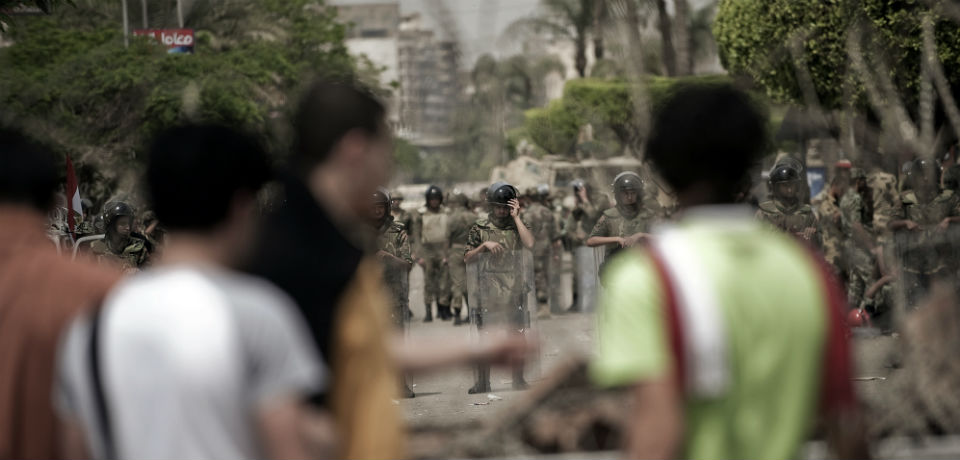Why nobody in the Middle East deserves to be an FP Leading Global Thinker this year.
I am not a big fan of lists. I happen to think that Kendrick Lamar owned 2013, but what is it to me if somebody else preferred Daft Punk or Kanye West, even Taylor Swift? How could anyone really say whether Lebron James is “better” than Michael Jordan? They’re all great in their own way, meaningful to different people for different reasons, and I’ve never been very good at figuring out the rationale for ranking them. Thus, to the no doubt endless frustration of my colleagues, I’ve never been much help with the annual FP Leading Global Thinkers list.
But this year, my contribution to the list of the Top Middle East Thinkers would have been easy: nobody.
I mean, just look at the Middle East right now. It has been an absolutely abysmal year. Egypt’s political process has been fundamentally broken. Libya and Yemen are falling apart. Tunisia’s promising transition is jumping the rails. The Gulf monarchies are clamping down hard at home and stirring up trouble abroad. And Syria’s catastrophe is a black hole at the heart of the Levant, with unspeakable human tragedy and unsettling effects rippling out across all its neighbors, while violence continues to spiral in Iraq. Does it look like anyone is doing any deep thinking?
FP didn’t quite go for my “zero option.” Still, the paucity of Arab political thinkers, leaders, and activists on this year’s list is telling in comparison to 2011 and 2012. 2011’s list featured such visionary activists as Tunisia’s Sami Ben Gharbia, Egypt’s Wael Ghonim and Mohamed ElBaradei, Syria’s Ali Farzat and Razan Zeitouneh (who was sadly kidnapped on Tuesday), Libya’s Fathi Terbil, Yemen’s Tawakkol Karman, Saudi Arabia’s Eman al-Nafjan and Manal al-Sharif, and Palestine’s Mustafa Barghouti (sorry about Alaa Al Aswany). 2012’s list added Bahrain’s courageous al-Khawaja family and Nabeel Rajab, Syria’s Rima Dali and Bassel Khartabil, along with Tunisia’s Ahlem Belhadj. A depressing number of those — and untold other — activists have been imprisoned or killed, have faded from view, or have become lightning rods within hotly polarized domestic political battles.
Political leaders haven’t fared well either. Al Jazeera’s Wadah Khanfar was a solid pick for 2011, while 2012 caught Qatar’s then-Emir Hamad bin Khalifa Al Thani at the peak of his country’s failed bid for regional leadership. Both have left the scene: Sheikh Hamad replaced by his son for reasons which remain murky, and Khanfar departing Al Jazeera ahead of the station’s precipitous decline. Turkey’s Ahmet Davutoglu and Recep Tayyip Erdogan were featured on both the 2011 and 2012 lists, but their reputations have suffered with Turkish foreign policy failures and growing domestic authoritarianism and repression of the Gezi Park protests. Khairat al-Shater of Egypt’s Muslim Brotherhood and Rached Ghannouchi of Tunisia’s Ennahda were good choices in 2011. But Egypt’s Muslim Brotherhood failed catastrophically in power, and Ghannouchi has become a polarizing figure in Tunisia’s embattled transition. Let’s hope that this year’s addition to the list, Iran’s President Hassan Rouhani, fares better.
As it happens, FP chose three really good people to populate this year’s list. Hossam Baghat and Heba Morayef rank among the very few Egyptians who came through the Morsy period, the coup, and the Sisi era with honor. (The same can’t be said of the list’s third Egyptian, Bassem Youssef, who jumped onto the “Muslim Brotherhood = Nazi” campaign which justified Egypt’s military coup.) And Farea al-Muslimi has been a truly courageous activist in Yemen, whose frank testimony brought the reality of the drone war to America.
But these are the exceptions that prove the rule, and can’t conceal the hard times that have befallen the thinkers, activists, and political leaders who helped make the 2011 Arab uprisings. It’s not because the region isn’t still brimming with brilliant, intense, energetic individuals determined to make a difference. But everyone — in Washington as much as across the Middle East — has struggled to find any purchase for positive new ideas in a region beset by failing institutions, political polarization, and the horrific toll of Syria’s regional war. Too many, whether Egyptian foes of the Muslim Brotherhood or Syrian activists facing Bashar al-Assad’s brutal depredations, let themselves be seduced by the promise of the easy fix of a military solution to their problems.
The list could have gone in a different direction, of course, with a “dark list” honoring the individuals who’ve done the most to make 2013 such a dismal year for the Middle East. Assad surely would deserve to be on it, for figuring out how to survive at any cost. And Iran’s Quds Force commander, Qassem Soleimani, rather than Rouhani, would probably claim a place for mastering the art of foreign support for a local proxy.
For instance, Time‘s popular vote winner for Man of the Year, Gen. Abdel Fattah el-Sisi, clearly had a massive impact on Egypt’s political trajectory in 2013. But FP was right to leave Egypt’s coup leader off its Leading Global Thinkers list. Military coups led by generals who believe that the army must rescue the nation from disastrous civilian politicians and then attempt to rule through a personality cult and compliant civilian front men are historically a dime a dozen. Perhaps in a few years, after the inevitable failure unfolds, Sisi can get together for tea with Gen. Pervez Musharraf and talk about the virtues of rescuing democracy from civilian politicians. In the meantime, though, a coup that empowered the security services, badly divided activists, unleashed mass violence and repression, delegitimized the very concept of democracy, and broke Egyptian politics for years to come should probably qualify him for the wall of shame.
Egyptian Muslim Brotherhood leaders such as former President Mohammed Morsy and 2011 FPHonoree Khairat al-Shater should probably be on the dark list, too. They failed utterly when given a historic opportunity to govern, proving wholly unable to forge a workable political consensus or to deliver on basic governance. It would have been far better had their incompetence been punished at the polls, of course. Egypt, and the entire region, would be a better place had a chastened President Morsy been forced to acknowledge his failures and change his governing style after anti-Brotherhood forces thrashed Islamists in parliamentary elections this year. But either way, in a single year, Morsy’s failed presidency mortally damaged a mainstream Islamist political project which had been developed over decades.
Several Gulf leaders could easily make this list as well. True, it doesn’t take that much deep thought for those monarchs to have stayed in power the last few years, given billions of dollars, aggressive and pervasive security services, and supportive foreign partners. It’s hard to even contemplate that the region’s leading thinkers might actually be the monarchs who are jailing citizens for sarcastic tweets — to say nothing of their brutal repression of activists calling for political reform. But more thought, perhaps, has gone into their efforts to block hopes of democratic change and foment sectarian tension beyond their borders. Egypt’s military coup and the subsequent repression and impunity might not have held up without extremely generous financial support from the Gulf. And Syria’s conflict might not have descended into today’s brutal sectarian war and jihadi revival had the Gulf states not been so keen on pouring guns and cash into their preferred armed groups.
The dark list should also recognize the jihadist thinkers and activists who brought al Qaeda and its affiliates back from the abyss so effectively. Whatever the actual role of the remnants of al Qaeda Central in guiding this new jihadist wave, Ayman al-Zawahiri seems to have had some useful thoughts on how al Qaeda could survive the death of Osama bin Laden. Leaders of jihadist factions fighting in Syria — such as Abu Mohammed al-Jolani of Jubhat al-Nusra, Abu Bakr al-Baghdadi of ISIS, and Hassan Aboud of Ahrar al-Sham — seem to have developed some innovative and effective thoughts on how to combine social services and rebel governance with insurgency and radical ideology. If it’s intellectuals we want, how about Abu Musab al-Suri, the grand theorist of the leaderless jihad? And then there’s the public Islamists of the Gulf, from Doha-based Yusuf al-Qaradawi to Kuwait’s Nabeel al-Awadhy, who provided mainstream religious and intellectual sanction to the Syrian jihad.
Oof. No wonder FP‘s editors didn’t take me up on the offer. When I think of the Middle East’s most profound thinkers today it’s a profoundly depressing list — even if it accurately reflects a difficult year. Perhaps it’s better to cast a wider net in search of those who cling painfully to the torch of principled human rights activism like Baghat and Morayef, or to keep the spotlight on political prisoners such as Rajab and Khawaja. There must be a way to shine a light on the thousands of unsung heroes working every day to ease the burden of Syrian refugees trying to give their children a normal life — and to convince people and governments to send them a lot more money (Here’s a useful list of groups which could use some help). And I would love to see scholars working on the Middle East join great academics such as this year’s honorees Erica Chenoweth and Jim Scott.
But these all seem to involve lists — and like I said, I’m no fan of lists.






